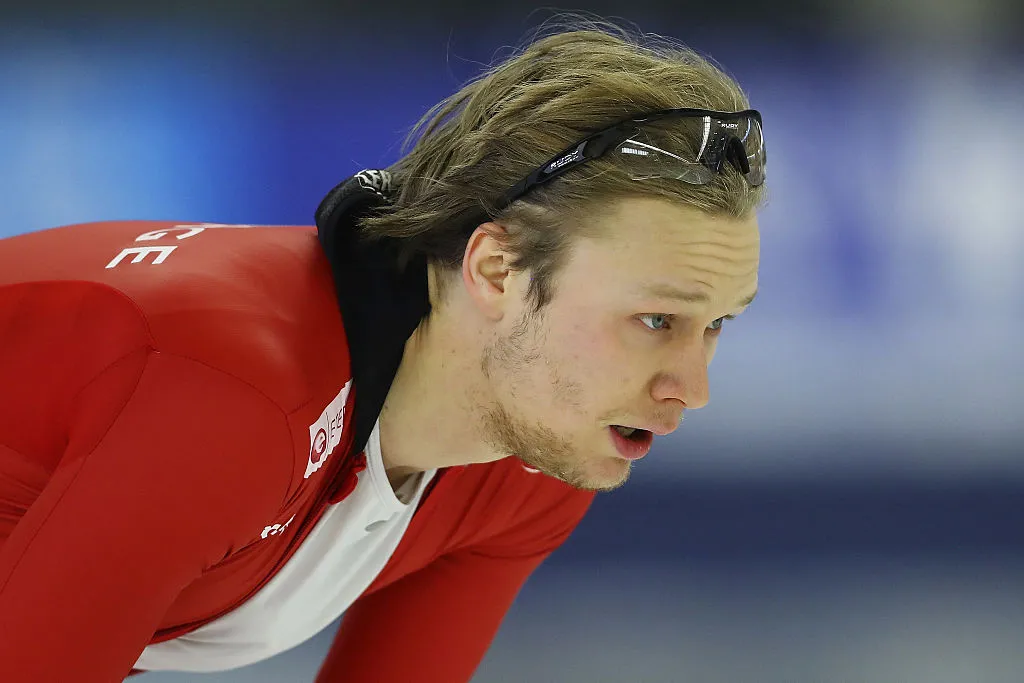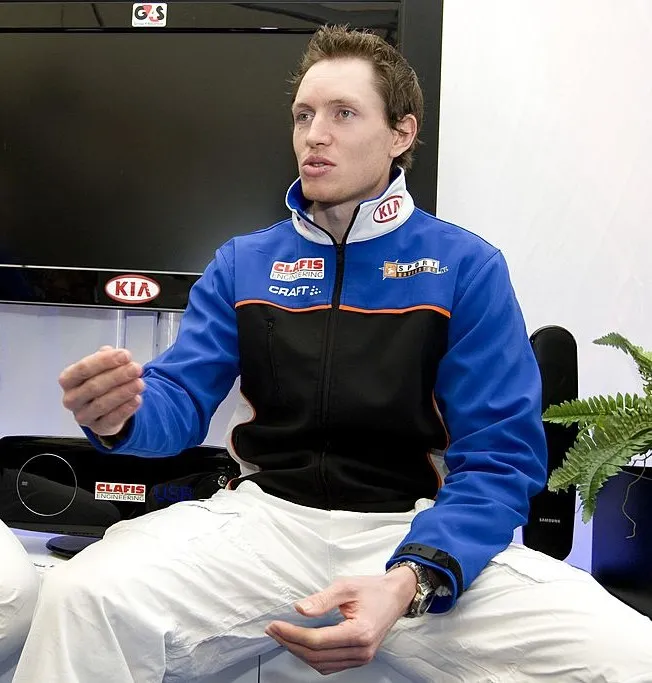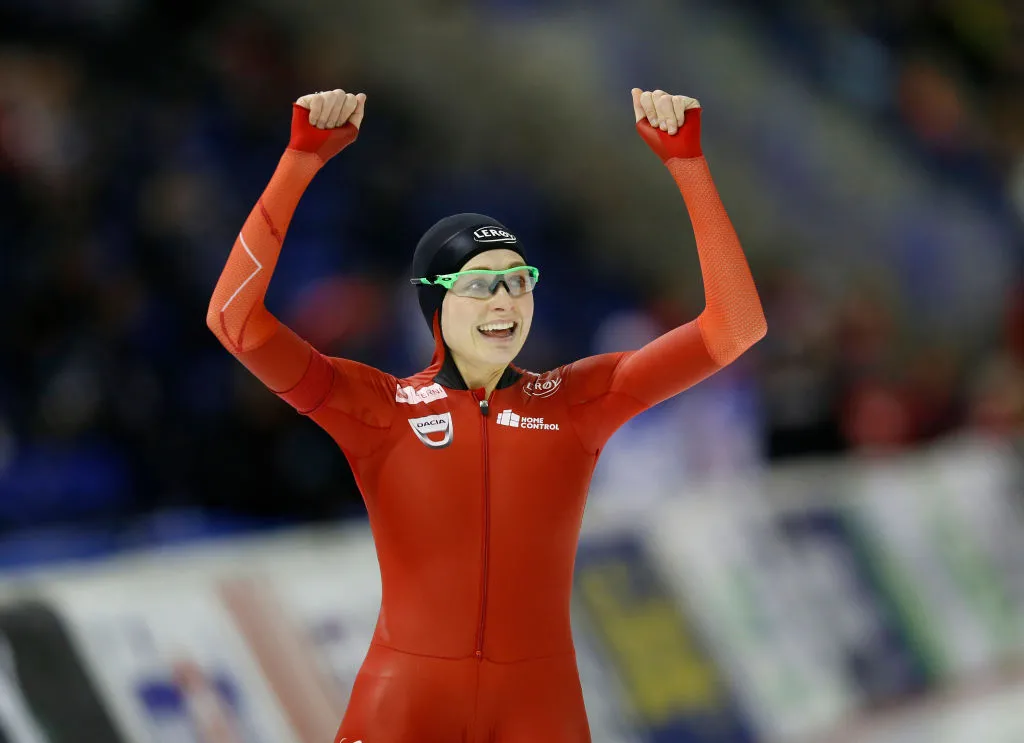On the back of the World Sprint Speed Skating Championships and with the Allround taking place in Hamar we brought an interview with two Norwegian skaters.
Q=interviewer (Irene Postma for ISU), HB = Hege Bøkko & HL = Håvard Holmefjord Lorentzen
 Hege Bøkko
Hege Bøkko
Q: You seem to be better than in the past years. What changed?
HB: It started to get better already last year, I changed the training; I started to train a bit less and more with quality, so I think that helped me a lot. And this year we also got a new coach, Jeremy Wotherspoon so he helped me a lot on the technical stuff. I started to skate better technically and focus on the acceleration, the first 100, top speed. I have been training on all the parts of the race, the acceleration, the top speed at the finish, I think that helps me a lot.
Before I have been training a lot for nine years now, on the national team, and the first year it worked really well for me, I also had a lot of illness, my body didn’t want to take the training. So I think I trained too much when my body didn’t want to listen.
Q: Did your body didn’t want to listen or you didn’t want to listen to your body?
HB: My body didn’t want to take the training, it didn’t respond like I wanted it to. Maybe I was too tired, maybe something was also wrong because I had something called TWAR (Taiwan acute respiratory agent), it is like an infection in my lungs. It took quite long before I knew I was ill. They told me it was ok, I could just train, but I felt something was wrong. It took a while before we took the test to find out if it was TWAR. I had to take three weeks of antibiotics to get rid of the bacteria in my lungs, and after that it took almost four years before I felt okay again. Three to four years.
Q: Four years… is that because of the bacteria itself?
HB: After three and a half years I started to feel like my body worked again, so it took a while. When you train that much it is hard for the body to do the restoration. So I had some years when my body didn’t want to listen. It was like a hard balance to keep up. I felt good one day and the 5 days after I felt really bad, and then maybe one good day again and five bad days. It was really hard to get through and mentally tough. I knew I was at a good level because in 2010 at the Olympics when I was 10th on the 1000m and I said: in four years I want to have a medal. But it got worse every single year. In 2014 in Sochi I just qualified for the team pursuit. I really didn’t want to go to the Olympics because I felt so bad and I didn’t feel I had anything to do there. So it was hard mentally to go through those years. But I am skating better now and feel stronger. I learned so much about myself and my body after some heavy years and you have to take everything with you and learn from it.
Q: Do you feel your body is coping well with all the training now?
HB: For sure. Last year, I started to feel I could train and get better every single day and every single week. That was a feeling that I hadn’t had for some years, and it was nice to feel that my body got stronger and improved. Finally my body wants to work together with my head and with me, so that is so much better. It is finally fun to skate again.
Q: What kept you going all those years, when it was so tough and was no longer fun?
HB: It was the dream of the Olympics and to skate my best. I am not sure if my best is a gold medal, or silver or bronze or a fifth place. But I know that I haven’t done my best yet. So I really want to improve, I know I can skate faster and better than I have done. It was the main thing in my head: that I can’t quit until I know I made the top level for myself. It was hard, but still I am happy that I got through it. And when I am skating and getting there, it is now all worth it. But there were some times that I didn’t want to skate so much, it was tough.
Q: Is there any pressure from Norway and Norwegians?
HB: Not really. Speed skating is famous in Norway but it is not that famous, because we have cross country, biathlon, alpine and those athletes are doing much better than us. But a few years ago I felt the pressure to become an allrounder, because in Norway an allround champion is a lot more prestigious than a single distance or sprint champion. But I feel things have changed, now we have a sprint team, and people are happy if you are doing well also in the sprint.
Q: What is the main goal for the coming years?
HB: The main goal is for sure the 2018 Olympics. I have a plan that I started one and a half year ago to be in the top in 2018. I know I have to take it step by step, I don’t want to rush that because that doesn’t help anyone. So far I think I’m doing well on my plan, for this season, which is to be stable in the A-group in the 1000. And now I got 5th as best result, so I’m ahead of my plan, so I am really happy about that and I also got A-group in the 500m.
Q: It looks like you chose to be a sprinter?
HB: I chose it one and a half year ago when I made my plan, I started to think I want to get on the 1000m, I think it is my best distance. Together with my mental coach I sat down, I had to make a choice: Do you want to do the long distance like an allrounder, or do you want a specific race? I turned to be a sprinter or middle distance skater and I am really happy about that choice.
Q: They say if two skaters are in a relationship, one gets better and the other gets worse. What do you think?
HB: Simen (Spieler Nilsen) won a gold medal in the team pursuit (World Cup in Heerenveen), so maybe I’m the one getting worse... But I think we can help each other to get better, actually. We both had some difficult years. We live together in Arendal since after the 2014 Olympics. Almost two and a half years ago already. Time flies!
Q: Do you discuss other things besides skating?
HB: Yea. We try to not speak a lot about skating, because we both want to have some time off speed skating. When we are home together, we almost never talk about skating. For sure sometimes, we try to help each other and if we want to talk about it of course we are there to support each other, but we try to not think about skating too much.
Q: Do you feel valued as a Norwegian female athlete? Usually the men skaters are known in Norway but not so much the ladies.
HB: Yes, that is true but I haven’t felt that. They respect women, so I don’t have a problem with that.
Q: Is there anything else you feel like sharing with us?
HB: I don’t know. I have been around for so long, although I am still kind of young (25), but I have participated in the world cup for 9 years. I feel people know me but still I know I can be better on the ice. I want to be fast but still be a good person. I don’t like skaters or athletes who skate fast and don’t say hi any more. I still want to be down to earth, I think that is really important.
Q: What can you tell us about your team mate Håvard Lorentzen?
HB: He is really focused and a really relaxed person. He never stresses and always does the right thing to be the best skater he can be. Now he is so strong and technically good, so he is skating really fast. It is cool to see and I try to learn from him. I want to learn more from him to stay focussed but still relaxed.
 Håvard Holmefjord Lorentzen
Håvard Holmefjord Lorentzen
Q: How did your skating life start?
HL: I started cycling at age 8. There was this guy in Bergen, where I am from, who did speed skating in the winter and cycling in the summer. Me and my brother started to do that as well. And then from age 13 I only trained speed skating. Before that I did some skating on hockey skates with the family, but initially I was a cyclist. I was really good at it as well, like my oldest brother but he stopped.
I enjoyed speed skating more than cycling. The FANA club always had a lot of good skaters, like Sverre Lunde Pedersen and Sindre Hendriksen, it has a good environment for training and sports culture.
Q: Just like Hege Bøkko, you are much better this year than last year. What happened?
HL: In October 2015 I fell and cut my lower leg pretty bad in Inzell. I didn’t do any skating in the first part of the season, I was only in bed for one month with my foot up. After that I trained and got to race the World Cup in Stavanger (January 2016) and the Sprint and World Single Distances Championships on the 1000m. Before the fall I had an ok season, though not as good as I hoped for.
I really wanted to come back and show what I could do. It was boring to watch on the couch and not be part of the competition. At first when I cut my leg, it was hanging out from the skin. They took skin from the upper leg and put in on near the ankle. It looked really bad, I was a little bit afraid I wouldn’t be able to skate again.
Q: Where do you see room for improvement?
HL: I improved my top speed a lot; I’m not the fastest starter, so not the fastest on the 500m. I was 4th in the 1500m in Astana, 0.09 behind the podium, and in Harbin in the 1000m 0.13 behind the podium. That was pretty close. Hopefully in the future the podium is possible there. I need to work on the first 50m. I’m a little too slow there, but if I can improve that, it will help a lot.
Q: What is your strong point – and contribution in the team?
HL: I am calm and try to raise the spirit in the group by being funny and supporting the others.
Q: And can you tell what is Hege’s strong point?
HL: She has a good technique, smooth like me, we both are a bit similar. She is nice, has a lot of humour and spreads a lot of joy in the group.
 Q: Your coach now is Jeremy Wotherspoon, what does he bring?
Q: Your coach now is Jeremy Wotherspoon, what does he bring?
HL: It has been a little bit different training than with the Norwegian coaches, more focus on sprint. He is a good guy with a good eye on technique; he has improved the top speed of all skaters.
Q: Do you have time for hobbies?
HL: I like rock and metal music a lot, and I am a big Barcelona fan, football. I spend many hours watching that.
Q: Do you make music yourself?
HL: I have a drum set at home, and I learned to play myself. My brother is a guitar player and sometimes we play together. My younger brother by the way is a football player for Sandefjord football club. So I guess sports run in the family, it is in our nature. My dad plays badminton and supported me by driving me to training and stuff.
Thank you both for the interview and all the best with your season!
 Hege Bøkko
Hege Bøkko